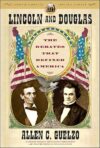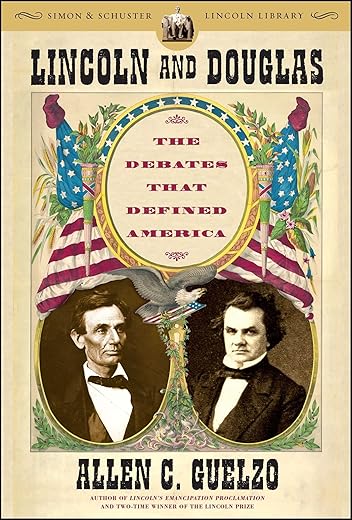
$5.52
Lincoln and Douglas: The Debates that Defined America Price comparison
Lincoln and Douglas: The Debates that Defined America Price History
Lincoln and Douglas: The Debates that Defined America Description
Lincoln and Douglas: The Debates that Defined America A Must-Read
Lincoln and Douglas: The Debates that Defined America is a remarkable publication by Simon & Schuster that offers an in-depth examination of the iconic debates between Abraham Lincoln and Stephen A. Douglas. Published on May 11, 2010, this reprint provides both historical context and modern insights, making it a valuable addition to any reader’s collection. Whether you’re a history buff or a casual reader, this book is essential for understanding the complexities of American politics and society.
Key Features of Lincoln and Douglas
- Comprehensive Content: Spanning 517 pages, this book covers the debates in detail, providing insights into their significance and impact on American history.
- Publisher’s Quality: Distributed by Simon & Schuster, the publication offers a reputable source for historical literature.
- Enhanced Reader Experience: Features like Text-to-Speech and Word Wise make the book accessible to a wider audience, enhancing comprehension and enjoyment.
- Format Compatibility: The file size of 4447 KB ensures a seamless download experience across devices.
Why You Should Read This Book
Understanding the Lincoln-Douglas debates is essential for anyone interested in American history. This book provides context beyond just the debates themselves; it delves into the issues of the time, including slavery and national unity, which are still relevant today. Readers will appreciate the thorough analysis and engaging writing style, making complex themes accessible.
Compare Prices Across Retailers
The price of Lincoln and Douglas: The Debates that Defined America varies across different suppliers. Be sure to check various platforms to get the best deal possible. A 6-month price history indicates fluctuating trends, allowing savvy buyers to make informed decisions on when to purchase.
Insights from Reviews and Reader Feedback
This book has received a spectrum of reviews, highlighting its strengths and addressing some critiques:
- Positive Reviews: Many readers praise the book for its informative content and writing quality. They appreciate the detailed accounts of the debates and how well the authors contextualize historical events.
- Noted Drawbacks: Some reviews mention a desire for more visuals or illustrations to accompany the text, which could enhance the reader’s experience.
Trending Videos and Unboxing
To further enrich your understanding of this historical masterpiece, you can find relevant unboxing and review videos on platforms like YouTube. These videos dive deep into what you can expect from the book and offer visual commentary that complements the reading experience.
Learning About the Lincoln-Douglas Debates
Engaging with Lincoln and Douglas: The Debates that Defined America will not only educate you about key figures in American history but will also provide insights relevant to contemporary issues. Examined through the lens of today’s political landscape, the debates continue to resonate, making this book not only historical but also timely.
As you navigate price comparisons and seek out the best value, remember that the insights from customer reviews and available multimedia resources will guide your decision. Explore further and understand how historical discourse has shaped modern America.
Don’t miss out on owning this enlightening text. Compare prices now!
Lincoln and Douglas: The Debates that Defined America Specification
Specification: Lincoln and Douglas: The Debates that Defined America
|
Lincoln and Douglas: The Debates that Defined America Reviews (6)
6 reviews for Lincoln and Douglas: The Debates that Defined America
Only logged in customers who have purchased this product may leave a review.












Jeff Kaminski –
Briefly, this book is great. It is very detailed, very informative, and extremely well written. The author’s judicious use of quotes and paraphrasing is extremely effective. I would highly recommend it for anyone who is interested in learning more about the Lincoln-Douglas debates and the historical context in which they occurred.
Morley Winograd –
Lincoln and Douglas: The Debates that Defined AmericaAs America renews its public debate on the role of race in our democracy in this election year, this book provides a compelling and comprehensive portrait of how Lincoln helped our country come to grips with the fundamental question of the immorality of slavery. The result was the first civic realignment in the nation’s political history. Just as the Lincoln/Douglas debates determined the primacy of the federal government in matters of civil rights, and FDR’s victory almost 75 years later confirmed the central role the federal government must play in our economic life, the 2008 election is due to produce our third civic realignment with the federal government assuming even more of a central role in the every day lives of Americans.
Richard K. Mason –
I never tire of reading the Lincoln-Douglas Debates themselves. That we have such a written account of this clash of ideas regarding the greatest conflict in our history is something to be grateful for. Allen Guelzo’s book is a beautifully written history of the Debates, their background, and their meaning and significance. Very highly recommended for anyone who wishes to know more about the Debates. Extremely informative and readable, as are all of his books. I will never forget Professor Hadley Arkes’ observation (c. 1994) regarding his students’ reactions when confronted by the Debates: many were brought to tears (of the unpleasant kind) by the discovery that their views corresponded to Stephen A. Douglas’s, while the few were greatly comforted to learn that theirs corresponded to Lincoln’s. Few things in American intellectual history have more significance than this presentation of ideas in the midst of our greatest crisis, and Mr. Guelzo’s book is a tremendous help in bringing the Debates to life.
John Stults –
A detailed, well written and easy to read description of the debates. It is easy to see from Lincoln’s speeches that it still applies to day to different issues and the author points this out in his epilogue. I highly recommend this book.
Chelsea –
This book is an excellent one. Dr. Guelzo certainly knows his stuff.
Rather than focusing the book primarily on the seven debates between Lincoln and Douglas, Guelzo expands the picture and examines in detail the entire political campaigns of 1858 in order to give the debates context. “Lincoln and Douglas” taught me much I didn’t know about Lincoln as a man and as a politician (sometimes we forget that in addition to being one of the greatest U.S. presidents in history, he also had to maneuver the political scene of his day – and boy, could he maneuver).
One star off for a lot of political jargon (which, being quite young in the world of elections and voting, I didn’t quite understand) and for not printing the full texts of the debates in the book. Still, I recommend it highly.
On a side note, I had the privilege of listening to Dr. Guelzo speak at my college last month, and he is a wonderfully knowledgable historian and the most eloquent speaker I’ve ever listened to. If you ever have a chance to hear him present on CIvil War topics, go with a notebook, pen, and high expectations.
Retired Reader –
The Lincoln-Douglas Debates in 1858 are largely remembered today because they brought an obscure Illinois lawyer and politician, Abraham Lincoln, to national prominence. Yet as this book demonstrates they also illuminate the confused and often contradictory U.S. attitudes towards slavery and race in the turbulent pre-Civil War years.
The Republican Party of the 1850’s was formed from the imploding Whig Party and disaffected members of the then Democratic Party around a common theme that slavery, the peculiar institution of the South should be contained within the bounds set by the Missouri Compromise of 1820. This not surprising in that the compromise was the work of Whig Henry Clay whose memory was still revered by many Whigs, including Lincoln. Under this compromise Missouri entered the U.S. as a slave state, but slavery would be excluded from all portions of the remainder of the Louisiana Purchase above latitude 36 30. Now the Republican Party including Lincoln made it clear repeatedly that they were not abolitionists. They did not want to abolish slavery where it already existed, but only to contain its expansion. They feared being overwhelmed in congress by slave holding states. Conversely, by the 1850’s the slave holding states begin to fear that as the territory of purchase started to develop into states, they would be overwhelmed in the congress by non-slave states and slavery itself would be at risk.
The Democratic Party of the time not exactly a pro-slavery party, but it was considerably less adamant than the republicans in wanting to contain the growth of slavery. It was seen by most as the party most sympathetic to the slave holding states of the south. Stephan A. Douglas arguably the most prominent member of the party hoped to maintain both party unity and to give the Democrats something like parity with burgeoning Republican Party. He therefore successfully overthrew the Missouri Compromise in favor of allowing each state to determine the status of slavery in that state. This `popular sovereignty’ bill infuriated the Republicans and as it turned out failed to satisfy the slave holders. It was this bill more than anything else that persuaded Lincoln to embark on a series of debates with Douglas.
The Debates and their back ground make for some fine reading. Yet it is discouraging to read how nobody including Lincoln really considered the African-American, either free or slave, to be equal to what was called the `white man’. Not even the majority of the abolitionists were willing to treat them as equals. Fredrick Douglass who was not only the equal of many white men, but superior to most was virtually ignored, insulted, or at best treated as an aberration. This is the unpleasant part of what is a very good book.